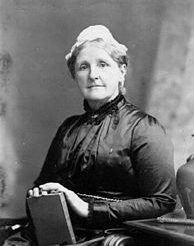Okay Y’all. You know that September is book giveaway month — and congratulations to Sharon G. and Beth P., who won last week’s copies of Sara Hagerty’s new release, Unseen (which my pal Jeannie Cunnion and I are super excited about!):

Today I want to share insights from another beloved author friend, Hannah Whitall Smith. And BTW, Hannah has no idea that we are friends, but I know we will be, in heaven. She looks like someone you could confide in:

The reason I want to tell you about Hannah today is because of something she wrote about the “mother-heart of God.” And if you’re praying for a child who has made some bad choices (or who has maybe even walked away from the Lord or from your family), listen up. Because Hannah said (and I know you mamas will get this) that her experience as a mother did more than anything else to shape her ideas about God’s goodness and love.
“Who,” she wrote, “can imagine a mother with a lost child ever having a ray of comfort until the child is found, and who can imagine God being more indifferent than a mother?”
(In other words, take the love you have for your child, times it by about a zillion, and realize that God will never stop loving — and pursuing — your child.)
Not only that, but I love what Hannah said about the whole idea of being “lost”:
“Are we not,” she wrote, “distinctly told that the Good Shepherd leaves the ninety and nine good sheep in order to find the one naughty sheep that is lost, and that He looks for it until He finds it? And, viewed in the light of motherhood, has not that word ‘lost’ a most comforting meaning, since nothing can be lost that is not owned by somebody, and to be lost means only, not yet found?”
Nothing can be lost that is not owned by somebody, and to be lost means only, not yet found.
Isn’t that just the best? As a mom, I love knowing that my children belong to God. I love knowing that he is loving enough to go after them, and powerful enough to do more in their lives than anything I could ask for or imagine.
And if you’re praying for a prodigal today, can I just encourage you with a couple of thoughts? This is something I talk more about in Praying the Scriptures for Your Adult Children, but that book doesn’t come out until December, and maybe some of you need this right now:
First, God knows our pain. He knows exactly what it’s like to love a child, to teach him to walk, to feed him and kiss his cheek—and then to have that child grow up and walk away, choosing a world marked by bondage, rebellion, dishonesty, and destruction. He knows what it’s like to be angry with a child or devastated by his choices…and yet still be utterly, overwhelmingly consumed by love. (If you don’t believe me, check out Hosea 1:1-11.)
Second, God’s love for our children is not contingent on their faithfulness (or on ours). God’s love is higher than the heavens, his faithfulness reaches to the skies, and even if we are faithless, he remains faithful. He can’t help it; that’s just who he is. (Psalm 108:4, 2 Timothy 2:13)
And finally, God gives us a wealth of promises that we can use to pray for our children. Jesus told his disciples that no one could come to him “unless the Father who sent me draws them” (John 6:44), so let’s pray that. Let’s ask our gracious Father – the God who is infinitely tender, and infinitely strong – to draw our kids to Christ, and bring them home.
Heavenly Father,
Give _____ a heart to know you, that you are the Lord. Count ______ among your people. Be their God. And draw them to return to you with all their heart. (Jeremiah 24:7)
Amen.

(The quotations from Hannah Smith are from the original edition of her spiritual autobiography, The Unselfishness of God. I can’t find that book in print, and more recent versions omit several chapters. But Catherine Marshall talks about Hannah and the mother-heart of God in her book Beyond Our Selves – you can find the relevant stuff in chapter 2.)



 Yeah. That’s my plant. It is (was?) an impatiens, but a garden guru pal said it was a goner, a victim of “mildew and blight.”
Yeah. That’s my plant. It is (was?) an impatiens, but a garden guru pal said it was a goner, a victim of “mildew and blight.”













